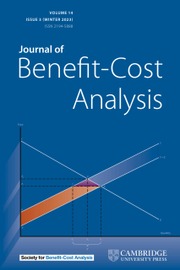Article contents
Accounting for the Distribution of Benefits and Costs in Benefit–Cost Analysis
Published online by Cambridge University Press: 17 December 2020
Abstract
Benefit–cost analysis (BCA) is often viewed as measuring the efficiency of a policy independent of the distribution of its consequences. The role of distributional effects on policy choice is disputed; either: (a) the policy that maximizes net benefits should be selected and distributional concerns should be addressed through other measures, such as tax and transfer programs or (b) BCA should be supplemented with distributional analysis and decision-makers should weigh efficiency and distribution in policy choice. The separation of efficiency and distribution is misleading. The measure of efficiency depends on the numéraire chosen for the analysis, whether monetary values or some other good (unless individuals have the same rates of substitution between them). The choice of numéraire is not neutral; it can affect the ranking of policies by calculated net benefits. Alternative evaluation methods, such as BCA using a different numéraire, weighted BCA, or a social welfare function (SWF), may better integrate concerns about distribution and efficiency. The most appropriate numéraire, distributional weights, or SWFs cannot be measured or statistically estimated; it is a normative choice.
- Type
- Symposium: Papers from the 2019 European Meeting of the Society for Benefit-Cost Analysis
- Information
- Copyright
- © The Author(s), 2020. Published by Cambridge University Press on behalf of the Society for Benefit-Cost Analysis
References
- 14
- Cited by


